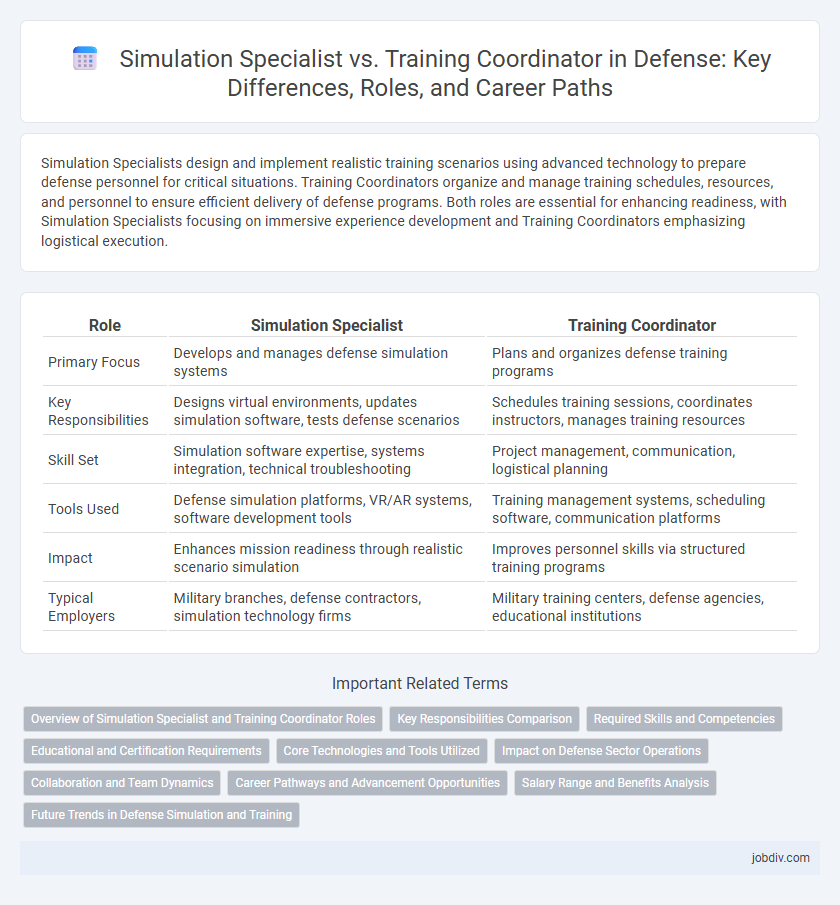Simulation Specialists design and implement realistic training scenarios using advanced technology to prepare defense personnel for critical situations. Training Coordinators organize and manage training schedules, resources, and personnel to ensure efficient delivery of defense programs. Both roles are essential for enhancing readiness, with Simulation Specialists focusing on immersive experience development and Training Coordinators emphasizing logistical execution.
Table of Comparison
| Role | Simulation Specialist | Training Coordinator |
|---|---|---|
| Primary Focus | Develops and manages defense simulation systems | Plans and organizes defense training programs |
| Key Responsibilities | Designs virtual environments, updates simulation software, tests defense scenarios | Schedules training sessions, coordinates instructors, manages training resources |
| Skill Set | Simulation software expertise, systems integration, technical troubleshooting | Project management, communication, logistical planning |
| Tools Used | Defense simulation platforms, VR/AR systems, software development tools | Training management systems, scheduling software, communication platforms |
| Impact | Enhances mission readiness through realistic scenario simulation | Improves personnel skills via structured training programs |
| Typical Employers | Military branches, defense contractors, simulation technology firms | Military training centers, defense agencies, educational institutions |
Overview of Simulation Specialist and Training Coordinator Roles
Simulation Specialists design and operate advanced virtual environments to replicate combat scenarios, enhancing tactical skills and decision-making for military personnel. Training Coordinators manage the planning, scheduling, and execution of comprehensive defense training programs, ensuring alignment with strategic objectives and compliance with military standards. Both roles are critical in defense training, with Simulation Specialists focusing on technical simulation development and Training Coordinators overseeing overall training logistics and effectiveness.
Key Responsibilities Comparison
Simulation Specialists design and operate advanced training simulations to replicate real-world combat scenarios, ensuring immersive and accurate mission rehearsal. Training Coordinators manage and schedule training programs, coordinating personnel, resources, and curricula to maximize operational readiness. Both roles require close collaboration with defense units, but Simulation Specialists focus on technical simulation delivery while Training Coordinators emphasize planning and administrative oversight.
Required Skills and Competencies
Simulation Specialists require expertise in software modeling, systems analysis, and real-time simulation technologies, alongside strong problem-solving and technical troubleshooting abilities. Training Coordinators must excel in curriculum development, instructional design, and effective communication skills to manage training programs and coordinate personnel efficiently. Both roles demand proficiency in project management and a deep understanding of defense operational protocols to ensure mission readiness.
Educational and Certification Requirements
Simulation Specialists typically require a background in computer science, engineering, or military technology, often holding certifications like Certified Simulation Specialist (CSTS) to demonstrate technical proficiency in defense simulation platforms. Training Coordinators usually possess degrees in education, instructional design, or human resource management, complemented by certifications such as Certified Professional in Learning and Performance (CPLP) to effectively manage and develop military training programs. Both roles emphasize continuous education and specialized certifications to ensure alignment with evolving defense training standards and technologies.
Core Technologies and Tools Utilized
Simulation Specialists leverage advanced simulation software such as VBS3 and Unity 3D, along with VR/AR hardware, to create immersive training environments that replicate real-world combat scenarios. Training Coordinators utilize Learning Management Systems (LMS) like Blackboard and Moodle to organize, schedule, and monitor training programs, ensuring compliance with military standards and readiness requirements. Both roles rely heavily on data analytics platforms to assess performance metrics and optimize training effectiveness in defense operations.
Impact on Defense Sector Operations
Simulation Specialists enhance defense sector operations by developing realistic virtual environments that allow personnel to practice complex scenarios without real-world risks, improving tactical readiness and decision-making skills. Training Coordinators optimize defense workforce performance by designing and managing comprehensive training programs that ensure consistent skill development and operational compliance across units. Both roles are critical for maintaining a capable and adaptive defense force, but Simulation Specialists directly influence operational preparedness through immersive technology integration.
Collaboration and Team Dynamics
Simulation Specialists and Training Coordinators collaborate closely to enhance defense training programs by integrating realistic scenarios and structured learning objectives. Simulation Specialists develop and manage advanced virtual environments that replicate battlefield conditions, while Training Coordinators organize and oversee training schedules, ensuring alignment with strategic goals and team readiness. Their teamwork fosters dynamic training sessions that improve communication, decision-making, and operational effectiveness within military units.
Career Pathways and Advancement Opportunities
Simulation Specialists in defense focus on developing and managing virtual training environments, leveraging expertise in software, hardware integration, and system troubleshooting to enhance soldier readiness. Training Coordinators oversee the planning, scheduling, and execution of training programs, emphasizing organizational skills and personnel management to align exercises with strategic military objectives. Career advancement for Simulation Specialists often leads to senior technical roles or simulation program management, while Training Coordinators typically progress into higher-level operational leadership or training development positions within defense organizations.
Salary Range and Benefits Analysis
Simulation Specialists in defense typically earn between $65,000 and $90,000 annually, with benefits including health insurance, retirement plans, and performance bonuses. Training Coordinators often have a slightly broader salary range from $60,000 to $85,000, supplemented by comprehensive benefits like tuition reimbursement and flexible work schedules. Salary variations depend on experience, security clearance level, and specific program requirements within military or defense agencies.
Future Trends in Defense Simulation and Training
Simulation Specialists leverage advanced technologies such as artificial intelligence, virtual reality, and augmented reality to create immersive and adaptive training scenarios that enhance tactical decision-making and operational readiness. Training Coordinators focus on integrating these innovative simulation tools into comprehensive curriculum development, ensuring alignment with evolving defense strategies and compliance with military standards. Future trends emphasize increased interoperability, data-driven performance analytics, and cloud-based simulation platforms to optimize training effectiveness and scalability across defense units.
Simulation Specialist vs Training Coordinator Infographic

 jobdiv.com
jobdiv.com